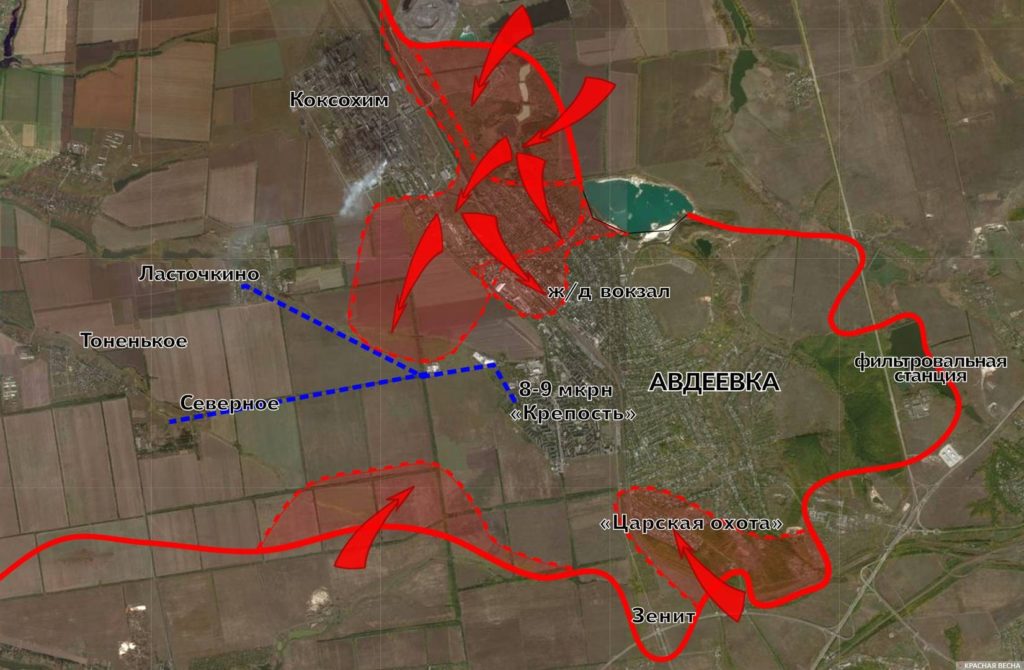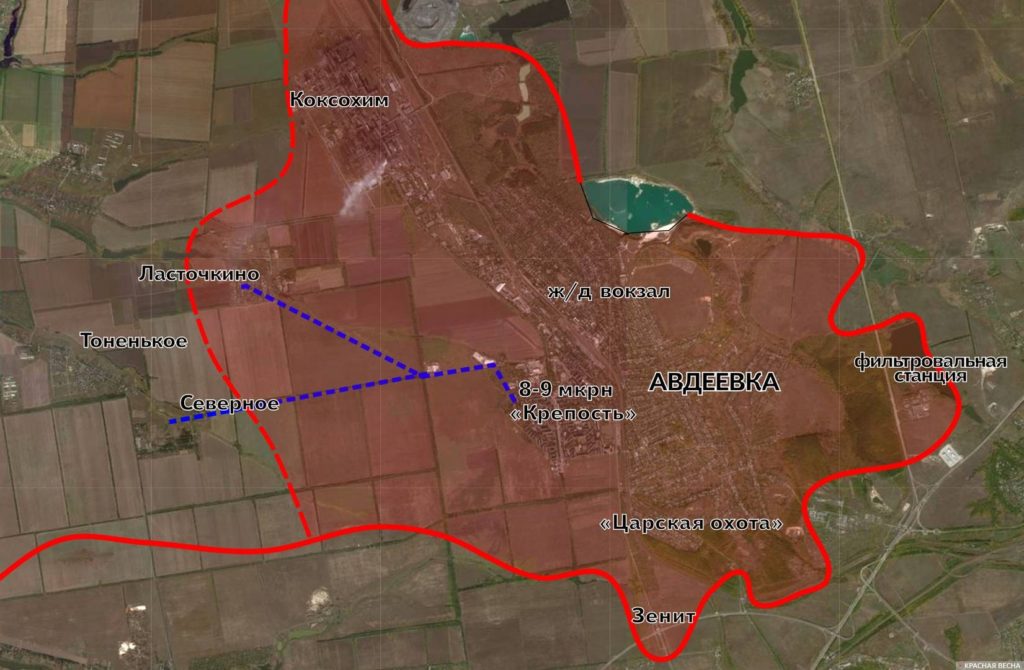During the battle of Avdeevka, Russian troops showed that they were able not only to defend themselves steadfastly but also to attack successfully despite the “positional war” declared by the West. And the West did not like it
Russian Defense Minister Sergey Shoigu reported to Russian President Vladimir Putin on February 17 that Russian troops had taken full control of the town of Avdeevka.
Russian units continued to move carefully in the city’s center and entered the most powerful fortification of the Ukrainian armed units, Avdeevka Coke Plant, but met resistance nowhere, except for separate scattered pockets of resistance. The enemy hurriedly left the city, abandoning heavy equipment, ammunition, and even their own wounded.
The forty-five-day operation to liberate Avdeevka was completed.

© Rossa Primavera News Agency
The Russian units have yet to complete a complete sweep of all parts of the city from the remnants of the enemy, the rear guard units have yet to collect and count all the trophies left behind by the Ukrainian armed units, the military engineers have yet to clear the city of mines, and the funeral teams have yet to bury the bodies of the dead Ukrainian militants. However, even now it is already evident that this successful operation for Russian troops to liberate the city closest to Donetsk differs sharply from previous ones.
By the standards of the Great Patriotic War, the battle of Avdeevka cannot be called large either in terms of the number of troops involved (less than 100,000 men on both sides) or in terms of area (the Russian units managed to liberate just under 40 square kilometers of the Donetsk People’s Republic land). But not for the current conflict. The consequences of our successful offensive have yet to be dealt with, but even the first of them must be appreciated.
For the first time in the two years since the start of the special operation, Russian troops demonstrated to the enemy the fundamentally different work of assault groups. During the battle for Avdeevka, the entire complex army machine, from mortar and heavy artillery units to aviation, worked under the tasks of the advanced unit, often consisting of an extremely small number of soldiers. And it had its results. The defenses and fortifications that the Ukrainian armed units had been building since 2014 did not hold.
For the first time since the front line more or less stabilized in the autumn of 2022, the enemy did not hold on and ran. Exactly ran, abandoning their wounded, equipment, and ammunition, leaving their well-fortified positions, which were not even under attack by Russian troops. This was new.
It came to the point that the famous Ukrainian 3rd Assault Brigade (formerly Azov (organization banned in Russia)), which is considered one of the most well-trained and most resilient among the Ukrainian armed units, refused to carry out the orders of its command. Instead of storming Russian positions on February 15 to break through a corridor to the blockaded garrison of Avdeevka, it retreated, leaving some of its men surrounded. Not only that, the brigade left its positions at the Azov Coke Plant without a fight, which was not yet encircled and Russian troops had not even attacked it.
This was the last straw for the city’s blockaded Ukrainian garrison. On February 16, the uncontrolled withdrawal of units from the front line began. Carrying only small arms, leaving the wounded behind, Ukrainian soldiers in small groups tried to escape westward along the last country road, which was already being shot through by our units.
The results of the tragedy of the Ukrainian armed units from February 16 to 17 are yet to be evaluated, but, according to the raw estimation, the Russian military said that 1,500 Ukrainian militants had been killed in those 24 hours alone. “The road to Avdiivka is filled with Ukrainian corpses” the CNN website wrote in an article on a few days later. In turn, the New York Times, citing estimates of the Ukrainian military, as well as high-ranking Western officials, estimates that about a thousand Ukrainian soldiers and officers have fallen into Russian captivity in Avdeevka. Our military experts are more restrained in estimating the number of Ukrainian captives, noting that there are “hundreds” of them.
Be that as it may, for this war it is a lot. Very much.
According to the Ukrainian media, the rapid agony of the “Avdeevka fortress” came as a total surprise for the Kiev authorities. For the office of the president of Ukraine, the refusal of the best brigade to follow orders and the beginning of the uncontrolled withdrawal of the Ukrainian armed units from their positions came as a shock. Instead of staying and fighting to the last man, as was the case in Mariupol at Azovstal, Azov (organization banned in Russia) chose to retreat. The new commander-in-chief of the Ukrainian Armed Forces Aleksandr Syrsky, had to order a withdrawal on the night of February 17 to show that the army did not panic and that “everything was going according to plan.”
According to Ukrainian sources, the Ukrainian Commander-in-Chief had to order the hasty transfer of units from the Kiev region to Avdeevka tto stabilize the front with the help of the new units. The enemy headquarters assess the situation in the Avdeevka area as critical. At the same time, no one has erected a ready-made new line of defense in the rear of the Avdeevka armed units.
Meanwhile, in Kiev, the Ukrainian President’s office ordered to “deal” with the commanders of the units that went to negotiate with Russian officers on the safe surrender of the wounded. It is not without reason there that they believe that this could become an extremely dangerous trend in the future.
Official Kiev, represented by Foreign Minister Dmitriy Kuleba and Prime Minister Denis Shmygal, immediately began complaining, blaming the Avdiivka defeat on the greed for money, ammunition and military equipment of Western allies. Perhaps a relatively new note to this harmonious chorus was added by Ukrainian President Vladimir Zelensky. During his speech at the Munich Security Conference, in his typical manner of a second-rate tragedian, he accused Moscow that the Russians are not fighting according to the rules, and that seizing Ukrainian well-prepared long-lasting fortifications, which have been built over decades, is not only unfair, but also “contrary to the ideology of war”. However, this is not new, Charles XII and Napoleon did the same.
The news of the libertion of Avdiivka, which came at the time of the Munich Security Conference, was taken most seriously by both Western military experts and Western politicians. And while the former were primarily struck by the refusal and unauthorized withdrawal of one of the Ukrainian armed units’ best brigades at the most critical moment for the Ukrainian garrison, the latter saw a formidable omen of a possible future Ukrainian defeat.
The conflict developed in Moscow’s favor, faith in Western support faded, and optimism was replaced by unrelenting despondency. Russia’s victories have shaken world leaders’ faith in the prospects for war in Ukraine, the Financial Times reported following the Munich Security Conference.
Admiral Rob Bauer, head of NATO’s military committee, admitted at the same conference after the surrender of Avdeevka that Kiev’s Western allies were “overly optimistic about the war in 2023.”
Heather Conley, head of the German Marshall Fund, noted that “we’re going to see Ukraine suffer from battlefield losses, we could see significant Russian gains, and the Ukrainians have no ammunition left.”
CNN notes that Ukraine’s loss of Avdeevka was a turning point in the conflict.
“It is a pivotal moment, where both Russian advances and Western atrophy threaten to transform the biggest land war in Europe since the 1940s,” the channel stresses.
FoxNews, a US conservative TV channel, also agreed with CNN.
“The withdrawal is seen as a massive win for Russian President Vladimir Putin,” the channel says in its material.
Politico reporters noted that the atmosphere at the Munich Security Conference was gloomy. Even the European establishment’s wild “anti-Putin” party did not help.
“Only the staunchest Ukraine backers are willing to say it can win against Russia. But most attendees aren’t willing to say that,” Politico‘s journalists noted.
Perhaps the best person to speak out on this issue was Lithuanian Foreign Minister Gabrielius Landsbergis.
“During a conference in Munich, I was asked why I was so gloomy. Well someone has to tell it like it is, so here’s how things are: things are not going well,” Landsbergis said, describing the situation related to the Ukrainian conflict.
The West understood perfectly well what happened near Avdiivka. And it concluded that in the next crusade to the East for the final solution of the Russian question it itself will have to take the most active part. And this conclusion does not please the Western elites.
Of course, it is hardly worth listening to various hotheads, who in a victory frenzy prophesize a sharp dash of Russian troops to the west for hundreds of kilometers. The enemy’s morale is undermined, but it cannot yet be called broken in any way.

© Rossa Primavera News Agency
However, the significance of the victory in the operation to liberate Avdeevka cannot be underestimated. First, the liberation of Avdeevka showed that the Russian army is capable not only of holding firm in defense, but also of attacking in the most difficult conditions. Secondly, the new “trench crisis” (when defense becomes stronger than offense), which Western military experts started talking about after the failure of the summer and fall offensive of the Ukrainian armed units in 2023, can be overcome. The liberation of Avdeevka is direct proof of this. And thirdly, the only army that can do this so far is the Russian army.
But the prospect of a new war is already looming beyond the horizon of the Ukrainian victory, which is yet to be achieved. This time with the forces of united Europe. According to Boris Pistorius, head of the Bundeswehr, Russia has about five years to prepare for it.
This is the translation of the article by Dmitry Vetchinkin, first published on Rossa Primavera News Agency’s website on February 21, 2024.




